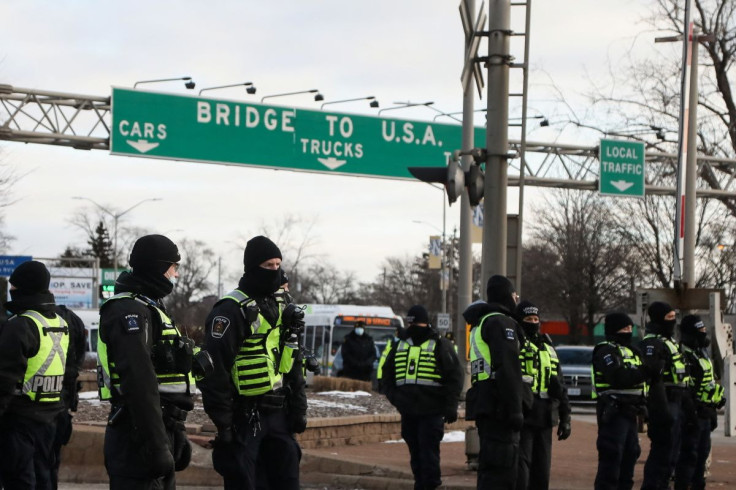Canada Police Begin Clearing Protesters Blocking Key U.S.-Canada Bridge

Canadian police on Saturday began clearing protesters opposing the government's strict pandemic restrictions who had blocked a key bridge to the United States, snarling international trade and prompting President Joe Biden to call for an end to the siege.
The Ambassador Bridge, North America's busiest land border crossing, had no traffic flowing for the fifth straight day by Saturday afternoon. About 15 trucks, cars and vans blocked traffic in both directions, choking the supply chain for Detroit's carmakers.
"We urge all demonstrators to act lawfully & peacefully," Windsor Police said in a Twitter post, asking commuters to avoid the areas affected by the demonstrations. The police action came more than 12 hours after a court order to ended the blockade came into effect.
Police in black uniforms with yellow vests moved behind the protesters' vehicles and, accompanied by police cruisers, slowly advanced on protesters, pushing them back from the bridge entrance. The number of demonstrators had thinned to roughly two dozen early on Saturday from about 200 on Friday night.
"We are opening up this intersection to traffic. If you fail to comply with our instructions you will be arrested," police told the crowd via a loudspeaker.
Protesters were seen moving back in a noisy but peaceful retreat, dismantling tents and barbecues.
The "Freedom Convoy" protests, started in the capital Ottawa by Canadian truckers opposing a vaccinate-or-quarantine mandate for cross-border drivers, entered its 16th day on Saturday. It has morphed into a wider protest against COVID-19 curbs, with people joining in with smaller vehicles, including cars, vans and pick-up trucks.
Ottawa Police said on Saturday they were waiting for reinforcements to end the "unlawful occupation." Ontario Premier Doug declared a state of emergency starting Friday midnight, but demonstrators "exhibited aggressive behaviour towards law enforcement," police said.
Canadian police have said the protests have been partly funded by U.S. supporters and Ontario froze funds donated via one U.S. platform, GiveSendGo, on Thursday.
Toronto-Dominion Bank has frozen two personal bank accounts into which C$1.4 million ($1.1 million) had been deposited in support of the protesters, a spokesperson said on Saturday.
COPYCAT PROTESTS
The protests have inspired similar convoys and plans in the United States, France, New Zealand and Australia.
In Paris, French police fired tear gas at demonstrators on the Champs Elysees avenue on Saturday shortly after a convoy carrying protesters against COVID-19 restrictions made it into the capital.
Protests have spread to three border points: the Ambassador Bridge, strangling trade between the two countries, and two smaller crossings in Alberta and Manitoba.
In Canada's financial capital Toronto, police blocked main roads leading to the central business district, ahead of a planned protest on Saturday. Protests were also planned in Fredericton in the province of New Brunswick. Local police said officers were stationed at entrances to the city to ensure traffic can flow freely.
A convoy of motorists in the United States is planning to head to the waterfront in Port Huron, Michigan, in support of protesters in Canada. Another U.S. group said two separate vehicle convoys will converge this weekend at the Peace Bridge, another U.S.-Canadian border crossing in Buffalo, New York.
Ford, the second-largest U.S. automaker, said on Friday it had temporarily halted work at its assembly plant in Ohio. General Motors and Toyota Motor Co also announced new production cuts. Companies have diverted cargo to stem losses amid production cuts.
The estimated loss from the blockades just to the automobile industry could be as high as $700 million, based on IHS Markit's data, which puts the daily flow in vehicles and parts at $141.1 million day in 2021.
Prime Minister Justin Trudeau has come under pressure from opposition party leaders to intervene, while U.S. President Joe Biden's administration urged his government to use federal powers. Trudeau promised Biden quick action to end the crisis.
Trudeau is scheduled to chair a meeting of his top advisors on Saturday, called the Incident Response Group, to discuss the ongoing blockades, according to his office.
© Copyright Thomson Reuters {{Year}}. All rights reserved.





















